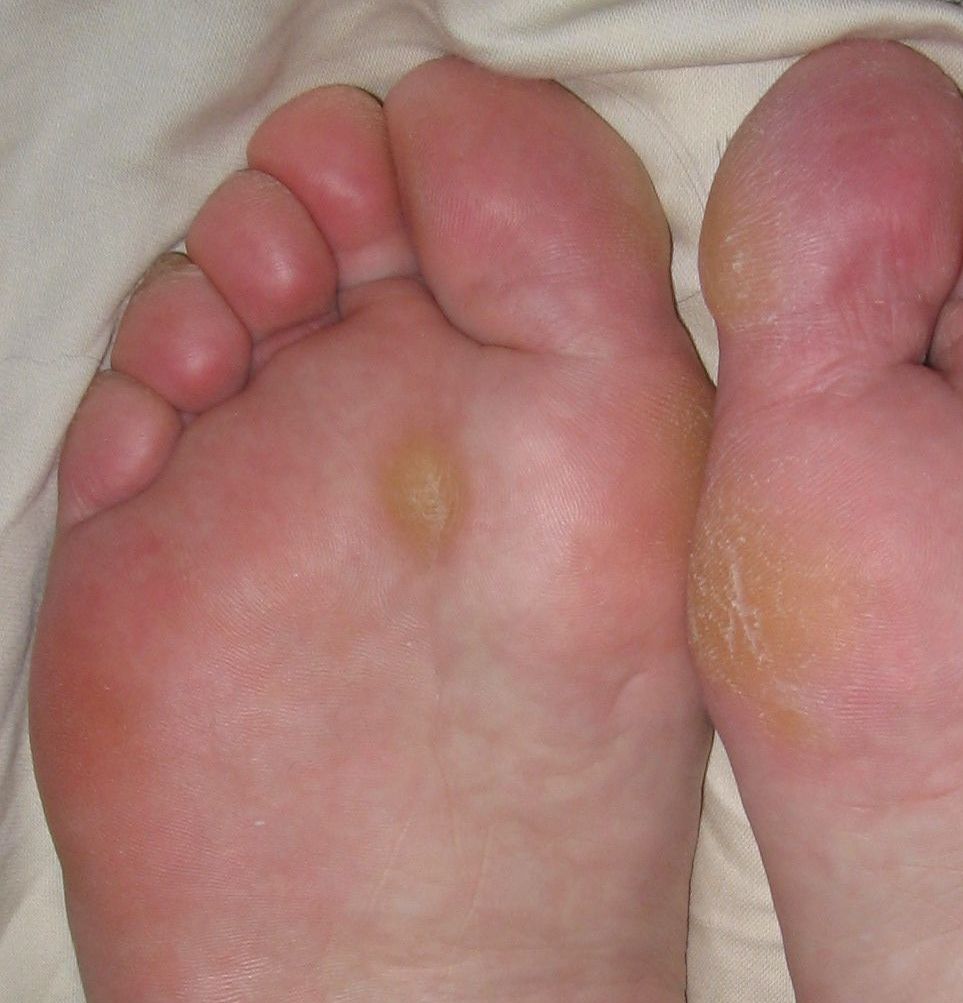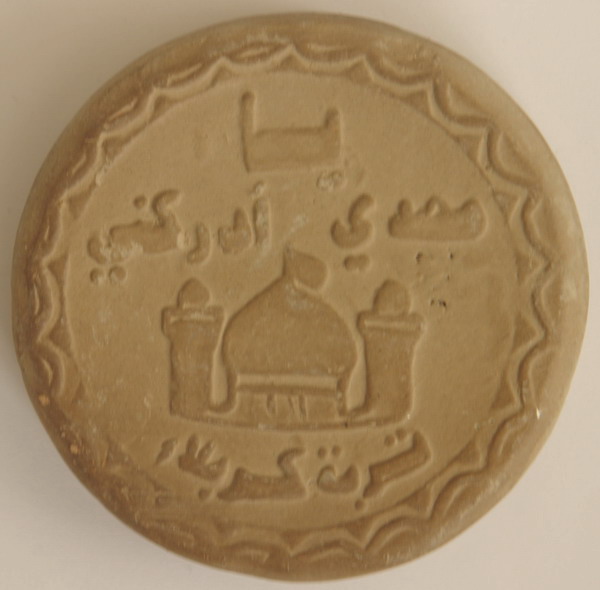|
Prayer Bump
A prayer callus, zabiba or zebiba ( ar, زبيبة ''zabība'', "raisin") is a callus on the forehead present in some devout praying Muslims, mainly in Egypt. Owing to its societal significance it is also known as the "devout sign". Among notable Egyptian leaders Anwar Sadat's reputation for personal piety was evidenced by a callus on his forehead from repeated prostration in prayer. Islam requires its adherents to pray five times a day (known as salat), which involves kneeling on a prayer mat and touching the ground (or a raised piece of clay called ''turbah'' by the Shia) with one's forehead. When done firmly for extended periods of time, a callus – the "prayer bump" – can develop on the forehead which may be considered as a sign of piety and dedication. It is mentioned in the Quran as: Some Muslims also believe that on the Day of Resurrection, this callus will fluoresce with an immense white light. However, ''riya'' (showing-off) is prohibited in Islam; if the praye ... [...More Info...] [...Related Items...] OR: [Wikipedia] [Google] [Baidu] |
Pilgrim At Masjid Al-Haram After Fajr Prayers, Makkah, 6 April 2015
A pilgrim (from the Latin ''peregrinus'') is a traveler (literally one who has come from afar) who is on a journey to a holy place. Typically, this is a physical journey (often on foot) to some place of special significance to the adherent of a particular religious belief system. In the spiritual literature of Christianity, the concept of pilgrim and pilgrimage may refer to the experience of life in the world (considered as a period of exile) or to the inner path of the spiritual aspirant from a state of wretchedness to a state of beatitude. History Pilgrims and the making of pilgrimages are common in many religions, including the faiths of ancient Egypt, Persia in the Mithraic period, India, China, and Japan. The Greek and Roman customs of consulting the gods at local oracles, such as those at Dodona or Delphi, both in Greece, are widely known. In Greece, pilgrimages could either be personal or state-sponsored. In the early period of Hebrew history, pilgrims traveled to ... [...More Info...] [...Related Items...] OR: [Wikipedia] [Google] [Baidu] |
Raisin
A raisin is a dried grape. Raisins are produced in many regions of the world and may be eaten raw or used in cooking, baking, and brewing. In the United Kingdom, Ireland, New Zealand, and Australia, the word ''raisin'' is reserved for the dark-colored dried large grape, with '' sultana'' being a golden-colored dried grape, and '' currant'' being a dried small Black Corinth seedless grape. Etymology The word "raisin" dates back to Middle English and is a loanword from Old French; in modern French, ''raisin'' means "grape", while a dried grape is a ''raisin sec'', or "dry grape". The Old French word, in turn, developed from the Latin word '' racemus'', "a bunch of grapes". Varieties Raisin varieties depend on the type of grape and appear in a variety of sizes and colors including green, black, brown, purple, blue, and yellow. Seedless varieties include the sultana (the common American type is known as Thompson Seedless in the United States), the Zante currants (black Corin ... [...More Info...] [...Related Items...] OR: [Wikipedia] [Google] [Baidu] |
Callus
A callus is an area of thickened and sometimes hardened skin that forms as a response to repeated friction, pressure, or other irritation. Since repeated contact is required, calluses are most often found on the feet and hands, but they may occur anywhere on the skin. Some degree of callus, such as on the bottom of the foot, is normal. Calluses are generally not harmful and help prevent blisters, as well as offering protection. However, excessive formation may sometimes lead to other problems, such as a skin ulceration or infection, or cause the affected person to try to offload the affected painful area, which can place excessive stress on the asymptomatic side. Rubbing that is too frequent or forceful will cause blisters, as opposed to calluses, to form. Cause Normally, a callus will form on any part of the skin exposed to excess friction over a long period of time. Activities that are known for causing calluses include (but are not limited to) construction work, many ... [...More Info...] [...Related Items...] OR: [Wikipedia] [Google] [Baidu] |
Anwar Sadat
Muhammad Anwar el-Sadat, (25 December 1918 – 6 October 1981) was an Egyptian politician and military officer who served as the third president of Egypt, from 15 October 1970 until his assassination by fundamentalist army officers on 6 October 1981. Sadat was a senior member of the Free Officers who overthrew King Farouk in the Egyptian Revolution of 1952, and a close confidant of President Gamal Abdel Nasser, under whom he served as Vice President twice and whom he succeeded as president in 1970. In 1978, Sadat and Menachem Begin, Prime Minister of Israel, signed a peace treaty in cooperation with United States President Jimmy Carter, for which they were recognized with the Nobel Peace Prize. In his eleven years as president, he changed Egypt's trajectory, departing from many of the political and economic tenets of Nasserism, re-instituting a multi-party system, and launching the Infitah economic policy. As President, he led Egypt in the Yom Kippur War of 1973 to r ... [...More Info...] [...Related Items...] OR: [Wikipedia] [Google] [Baidu] |
Islam
Islam (; ar, ۘالِإسلَام, , ) is an Abrahamic religions, Abrahamic Monotheism#Islam, monotheistic religion centred primarily around the Quran, a religious text considered by Muslims to be the direct word of God in Islam, God (or ''Allah'') as it was revealed to Muhammad, the Muhammad in Islam, main and final Islamic prophet.Peters, F. E. 2009. "Allāh." In , edited by J. L. Esposito. Oxford: Oxford University Press. . (See alsoquick reference) "[T]he Muslims' understanding of Allāh is based...on the Qurʿān's public witness. Allāh is Unique, the Creator, Sovereign, and Judge of mankind. It is Allāh who directs the universe through his direct action on nature and who has guided human history through his prophets, Abraham, with whom he made his covenant, Moses/Moosa, Jesus/Eesa, and Muḥammad, through all of whom he founded his chosen communities, the 'Peoples of the Book.'" It is the Major religious groups, world's second-largest religion behind Christianity, w ... [...More Info...] [...Related Items...] OR: [Wikipedia] [Google] [Baidu] |
Salat
(, plural , romanized: or Old Arabic ͡sˤaˈloːh, ( or Old Arabic ͡sˤaˈloːtʰin construct state) ), also known as ( fa, نماز) and also spelled , are prayers performed by Muslims. Facing the , the direction of the Kaaba with respect to those praying, Muslims pray first standing and later kneeling or sitting on the ground, reciting prescribed prayers and phrases from the Quran as they bow and prostrate themselves in between. is composed of prescribed repetitive cycles of bows and prostrations, called ( ). The number of s, also known as units of prayer, varies from prayer to prayer. Ritual purity and are prerequisites for performing the prayers. The daily obligatory prayers collectively form the second of the five pillars in Islam, observed three or five times (the latter being the majority) every day at prescribed times. These are usually (observed at dawn), (observed at noon), (observed late in the afternoon), (observed after sunset), and (observed ... [...More Info...] [...Related Items...] OR: [Wikipedia] [Google] [Baidu] |
Turbah
A turbah ( ar, تربة, lit=soil), or mohr ( fa, مهر, lit=seal), also known as khāk-e shefā ( fa, خاکِ شِفا, lit=medicinal soil, also used in Urdu) and sejde gāh ( fa, سجدہ گاہ, lit=place of prostration, also used in Urdu), is a small piece of soil or clay, often a clay tablet, used during salat (Islamic daily prayers) to symbolize earth. The use of a turbah is recommended in the Twelver Shia school of Islam, a unique practice of the sect, and many Hadiths mention the benefits of prostration (Sajda) upon soil or an alternative natural material. The most favoured soil is that of Karbala, the site of the martyrdom of Husayn ibn Ali; however, soil from anywhere may be used. In the absence of soil, plants or items made from plants may be substituted. This provision has been extended to include the use of paper. Following the instruction from the Quran, Shia Imam Ja'far al-Sadiq stated that "prostration must be performed on pure earth or what grows on it, provide ... [...More Info...] [...Related Items...] OR: [Wikipedia] [Google] [Baidu] |
Day Of Resurrection
In Islam, "the promise and threat" () of Judgment Day ( ar, یوم القيامة, Yawm al-qiyāmah, Day of Resurrection or ar, یوم الدین, italic=no, Yawm ad-din, Day of Judgement), when "all bodies will be resurrected" from the dead, and "all persons" are "called to account" for their deeds and their faith during their life on earth. It has been called "the dominant message" of the holy book of Islam, the Quran, Smith & Haddad, ''Islamic Understanding'', 1981: p.63 and resurrection and judgement the two themes "central to the understanding of Islamic eschatology". Smith & Haddad, ''Islamic Understanding'', 1981: p.64 Judgement Day is considered a fundamental tenet of faith by all Muslims, and one of the six articles of Islamic faith. The trials, tribulations and details associated with it are detailed in the Quran and the hadith (sayings of Muhammad); these have been elaborated on in creeds, Quranic commentaries ( tafsịrs), theological writing, Smith & Haddad ... [...More Info...] [...Related Items...] OR: [Wikipedia] [Google] [Baidu] |
Middle East Report
The ''Middle East Report'' is a magazine published by the Middle East Research and Information Project (MERIP). The headquarters is in Tacoma, Washington. History and profile MERIP began in 1971 by releasing an irregularly scheduled six-page newsletter called the ''MERIP Reports''. In 1973, the group began releasing this newsletter on a scheduled basis. In its online version, the ''Middle East Report'' is made available in a mixed access mode, with some open access articles and others requiring a paid subscription. The subscription covers both online and print editions. Opinions The magazine is consistently critical of Israel, Zionism, and the foreign relations of the United States in the Middle East. In 2014, the editor wrote: Readership The magazine is available in the United States, Europe, the Middle East, and online worldwide. Staff Until 1995, Joe Stork was editor-in-chief An editor-in-chief (EIC), also known as lead editor or chief editor, is a publication's editor ... [...More Info...] [...Related Items...] OR: [Wikipedia] [Google] [Baidu] |
Salah
(, plural , romanized: or Old Arabic ͡sˤaˈloːh, ( or Old Arabic ͡sˤaˈloːtʰin construct state) ), also known as ( fa, نماز) and also spelled , are prayers performed by Muslims. Facing the , the direction of the Kaaba with respect to those praying, Muslims pray first standing and later kneeling or sitting on the ground, reciting prescribed prayers and phrases from the Quran as they bow and prostrate themselves in between. is composed of prescribed repetitive cycles of bows and prostrations, called ( ). The number of s, also known as units of prayer, varies from prayer to prayer. Ritual purity and are prerequisites for performing the prayers. The daily obligatory prayers collectively form the second of the five pillars in Islam, observed three or five times (the latter being the majority) every day at prescribed times. These are usually (observed at dawn), (observed at noon), (observed late in the afternoon), (observed after sunset), and (observed ... [...More Info...] [...Related Items...] OR: [Wikipedia] [Google] [Baidu] |



.jpg)


